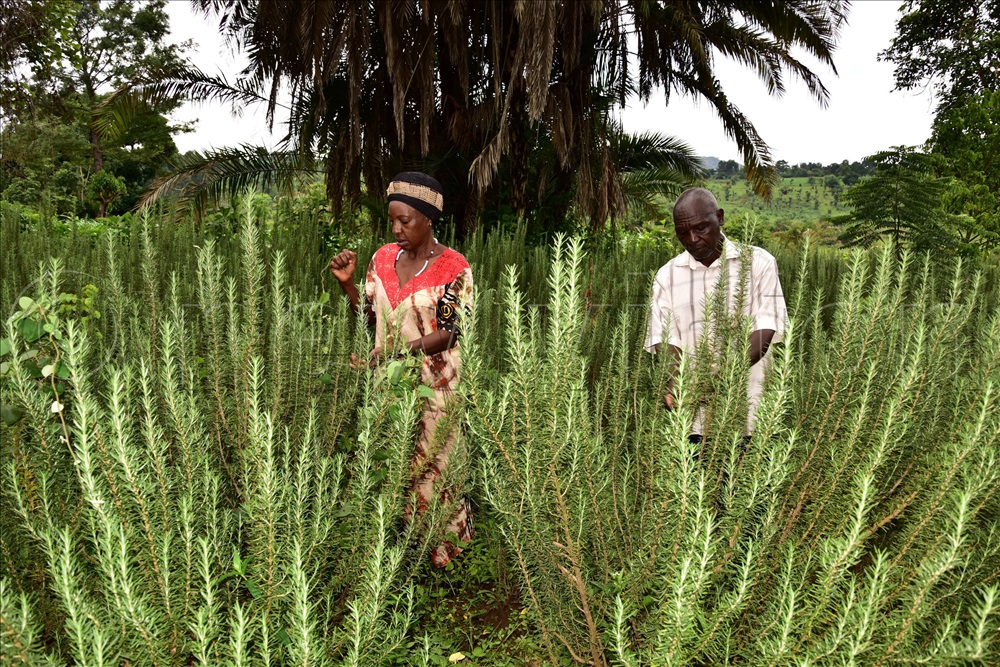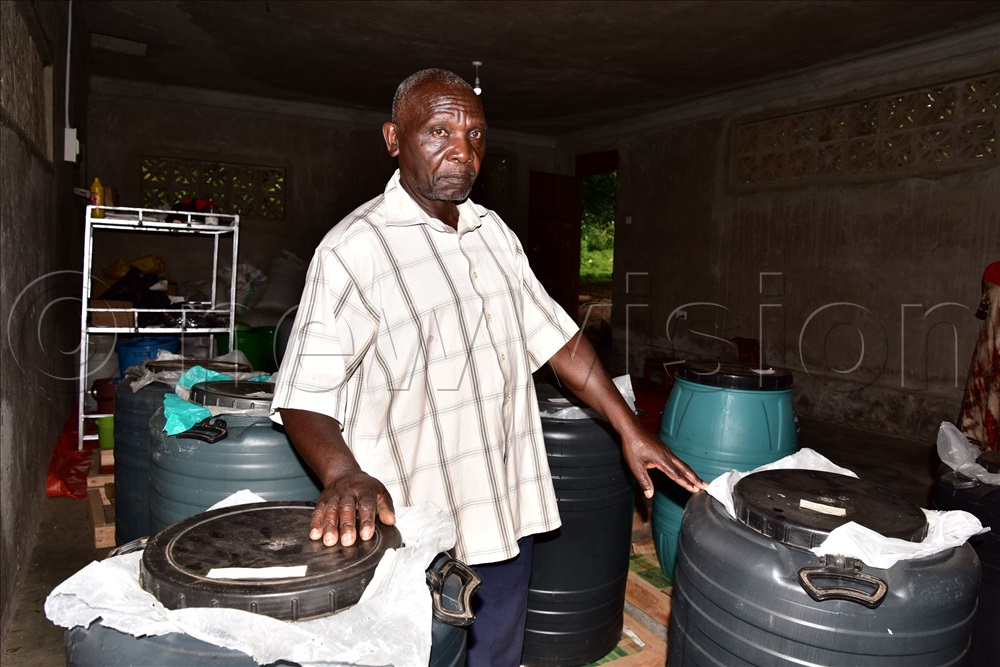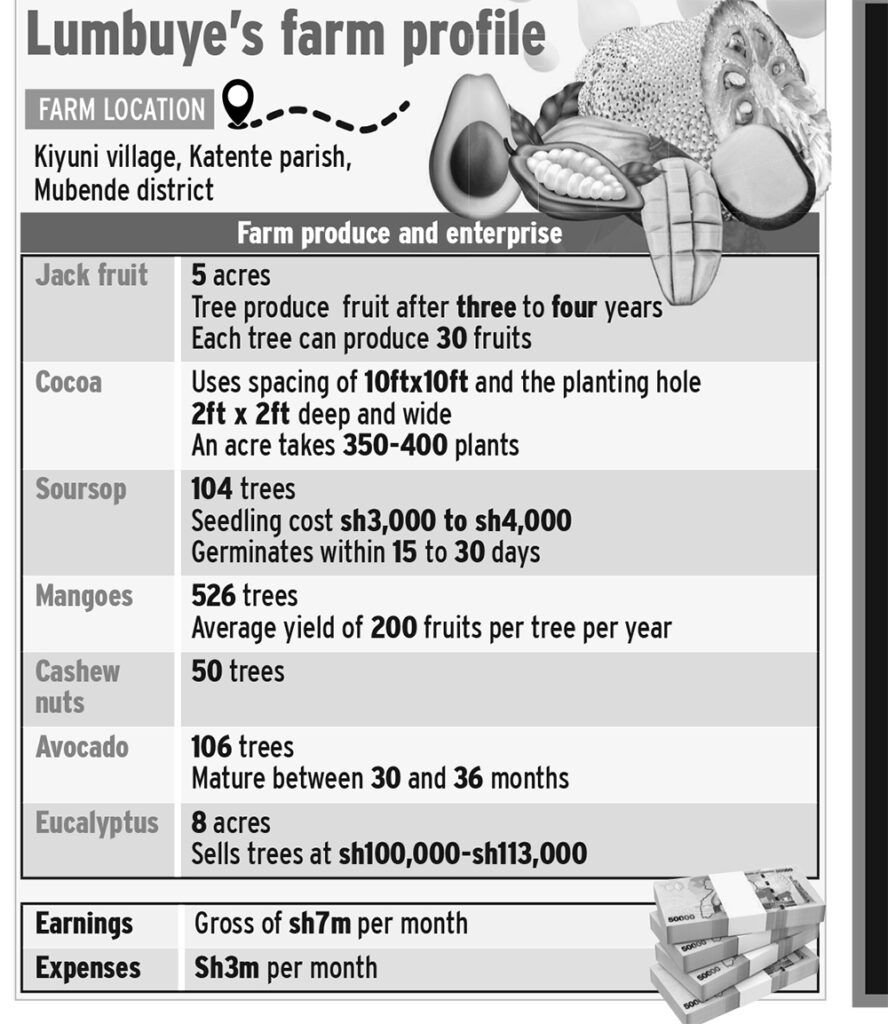By Umar Nsubuga
Sitting behind a collection of wine bottles, Stephen Lumbuye smiles happily. The collection includes wines made from mangoes, matooke, jackfruits, and pineapples, among others.
A resident of Kiyuni village, Katente parish in Mubende district, Lumbuye is an avid agriculturalist who has transitioned from merely growing crops to adding value to them.
After retiring from public service in 2013, life became easier for the 60-year-old Lumbuye because he had set up his farm.
“The belief that wine can only be made from factories and not by farmers must be changed,” he says.
Lumbuye is tapping into a readily available resource that is not fully utilized by farmers.
“Many fruits are easy to grow and are available in many areas of the country. However, other than being eaten, little value addition is put on them,” he notes.

Although he is recognized as a winemaker, Lumbuye also has land where he grows more produce to supplement what he harvests from the Kiyuni land.
Before retiring, Lumbuye was growing pineapples, which he mixed with bananas on 10 acres. This enterprise lasted a few years because, for some reason, they failed to yield what he wanted.
“I replaced them with fruit trees,” he says.
To start the project, Lumbuye was inspired by his late parents, who were commercial farmers.
“When I was young, my father had a poultry project, but only had local ones and coffee. I had a mission to accumulate more than what he had,” he says.
How he started
Lumbuye, the owner of Biva Eri Mukama Mixed FarmLtd, says this venture can offer an alternative source of income through value addition from all fruits.
Before retiring, Lumbuye realized he was not making progress while employed and needed to reassess his approach. He decided to invest in pineapple and tree farming with the money he had accumulated by 2013.

Five years before retiring, his pineapple and tree planting had accumulated.
“I used my savings to buy more 30 acres.”
He encourages Ugandans not to fear investing in long-term projects because with determination and focus, they pay off. In 2013, mangoes came first on the list for Lumbuye, of which he planted 30 trees.
He also acquired 20 seedlings of oranges, guavas, soursop, jackfruits, and avocados, aiming for a variety of fruits.
“I planted some in my compound. After two years, the harvests were massive. This inspired me to increase the number of seedlings,” he says.
Lumbuye mentions that he did not start as a winemaker, but as a farmer growing pineapples, mangoes, jackfruit, avocado, and cocoa.
“When I took my produce to the market, what I earned was ridiculous and that is when I decided to add value,” he says.
Lumbuye began researching wine production and realized that with clean jerry cans, bottles, and a simple boiler, he could start producing wine at his farm.

With value addition, the produce is processed into more valuable forms instead of selling it in its raw form. For example, pineapples can be turned into juice.
He adds that with proper planning, it is possible to have a ‘wine village’ in every sub-county in Uganda. His products have been appreciated by consumers, and he is pursuing a license from the Uganda National Bureau of Standards for a bigger market.
Growing fruits
Lumbuye, who has been growing fruits for over 20 years on more than 20 acres, encourages farmers by emphasising that setting up a cottage industry is not prohibitively expensive.
He also highlights that adding value to produce would enable fruit producers to earn more from their fruits.
Jack fruits
Lumbuye’s jackfruit farm spans five acres and boasts several varieties.
He notes that, on average, a jackfruit tree can grow to heights of up to 100 feet and starts bearing fruit after three years. There are various methods of planting jackfruit trees, including direct seeding or propagation from stems.
“Dig a 3×3 feet hole (apply compost manure in the holes before planting). Make sure the plant is receiving direct sunlight,” he advises.
As the tree grows taller than 12 feet, trimming its main trunk to eight feet encourages the growth of dense branches. Jackfruit trees typically start producing fruit within three to four years.
Each tree can yield as many as 30 fruits when young, increasing to over 100 as they mature. For instance, if each of your 10 trees yielded 30 fruits, that would amount to 300 fruits in the first year alone.
Jackfruit is a versatile addition to fruit salads and is commonly consumed fresh in Uganda. However, it can also be preserved as syrup or dried for longer shelf life.
Cocoa
Lumbuye emphasizes the importance of spacing in cocoa cultivation, recommending an ideal spacing of 3m x 3m (10ftx10ft) with planting holes measuring 2ft x 2ft deep and wide.
“Manure can be applied. Each acre takes 350-400 plants,” he advises.
“When starting a cocoa project, it’s crucial to first plant trees because cocoa requires shade, and you have to intercrop it with plants like coffee,” he explains.
Pruning the cocoa tree during the early stages is also essential. Cocoa thrives with filtered sunlight through trees.
Sustainable management of shade trees like Musizi and breadfruit not only allows the farmer to earn extra income from timber and fruits but also maintains or increases cocoa bean production each year.
Soursop
Lumbuye mentions that he has 104 trees of soursop, noting that the tree can grow up to three to 10 meters high. Proper planting is crucial for successfully nurturing a soursop tree.
“It will grow in a wide variety of soils from sandy to clay loams, but it prefers deep soil with good aeration. Its seedling costs between sh3,000 to 4,000,” he explains.
He advises planting the seeds about 2cm apart and 1cm deep. To ensure optimal growth, one should provide shade and keep the seedbed or seed box moist by watering it regularly.
Soursop seeds typically germinate within 15 to 30 days. The fruit features an inner cream-colored, fragrant, juicy, and edible pulp. Soursop trees typically produce their first fruits within three to five years of planting.
Harvesting should be conducted when the fruit’s colour changes from green to a yellowish-green. The unripe dark green fruit is covered with an inedible skin with spines.
Mangoes
Lumbuye currently has 526 mango trees, with an average yield of 200 fruits per tree per year.
“I sell each fruit at an average of sh1,000. So, each mango tree can generate an income of sh200,000, if not turned into juice. Mangoes have two harvest seasons, from May, June, and July, and from October to December,” he explains.
Cashew nuts
Lumbuye says cashew nuts seedlings grow best on well-drained, deep sandy soils, with an average annual rainfall of at least 800mm and an extended dry season to allow flowering and fruiting.
Certainly, this fits well into most parts of Uganda.
He says cashew nuts have not paid well yet but the magnitude of preparations in cashew nut production depends on several factors, such as the type of vegetation cover to be removed, the size of the farm and financial resources, the type of inputs to be used, and labour availability. He has 50 trees.
Avocado
Lumbuye mentions that he has 106 avocado trees of different types, including cultivars Avilla and Droson I, II, III.
He adds that they mature between 30 and 36 months. According to him, planting avocados requires minimal input, and natural manure can be used.
A reasonable organic matter content with good soil aeration is needed, along with a depth of at least one meter.
Eucalyptus
Lumbuye mentions that he has eight acres of eucalyptus, but he emphasizes that growing it well is no easy task. It requires careful cultural practices, especially the use of improved seeds, intensive land preparation, and thorough weeding (both pre- and post-planting).
According to Lumbuye, there are several suitable eucalyptus species to grow for large-sized poles and timber, particularly in areas with deep, fertile soils and mean annual rainfall greater than 1,250mm (eucalyptus grandis will usually perform best in such conditions).
He advises that when growing eucalyptus for timber or large poles, the plant spacing should not be as dense as for fuelwood and small poles.
For fuelwood and small building poles, a higher stocking compared to timber crops is justified, especially as the rotation is only a few years.
He sells the eucalyptus trees to people who need them for construction, firewood, timber for furniture construction, poles for electricity, and more.
“I normally sell them at sh100,000-sh113,000,” he says.
Community involvement
Lumbuye’s wife, Gladys Lumbuye, trains community members who are interested in fruit growing (mangoes, oranges, and passion fruits) and how to graft them.
This initiative has inspired many to start growing fruits and planting trees.
Lumbuye emphasizes that a business that provides value to others has higher chances of success compared to one that does not.
When choosing workers, Lumbuye advises to focus on their character first and then train them to excel at their jobs.
“There are a few honest and motivated people. When you hire such people, train them so they become good at their jobs,” he suggests.
Sales, produce, market
In a day, Lumbuye says he makes about 20-60 litres of wine, but with the Uganda National Bureau of Standards certificate, he thinks he will make more.
“In a month, after all deductions, wine brings in a profit of sh300,000 to sh500,000,” the farmer says.
Earnings and expenses
From all the enterprises, the farm earns an average gross of sh7m per month. After deducting expenses, including salaries for the farm, the farm retains around sh4m.
Tips and plans
Lumbuye plans to engage more farmers to produce fruits.
He also dreams of expanding his mindset and coaching others to reach more entrepreneurs in the district and beyond.
Lumbuye encourages people to start with any amount of money, emphasizing that even with sh1m, one can start a farming project.
“As long as you are committed, you can establish an enterprise.”
His passion to work with rural families to contribute to livelihoods stems from a heart-rending situation that he witnessed as a father.
Lumbuye says he plans to invest in modern machinery and equipment to streamline production.
Challenges
One of the impediments to wine processing is the costly packaging materials. Wine production requires filters, juice extractors, boilers, and branded papers for the bottles.
Lumbuye says he still needs a lot of money to operate his products, yet he does not receive any support. Initially, some of his neighbours did not appreciate his efforts and even resorted to stealing his fruits, mainly mangoes. However, he decided to incorporate many of them by giving them seedlings.





